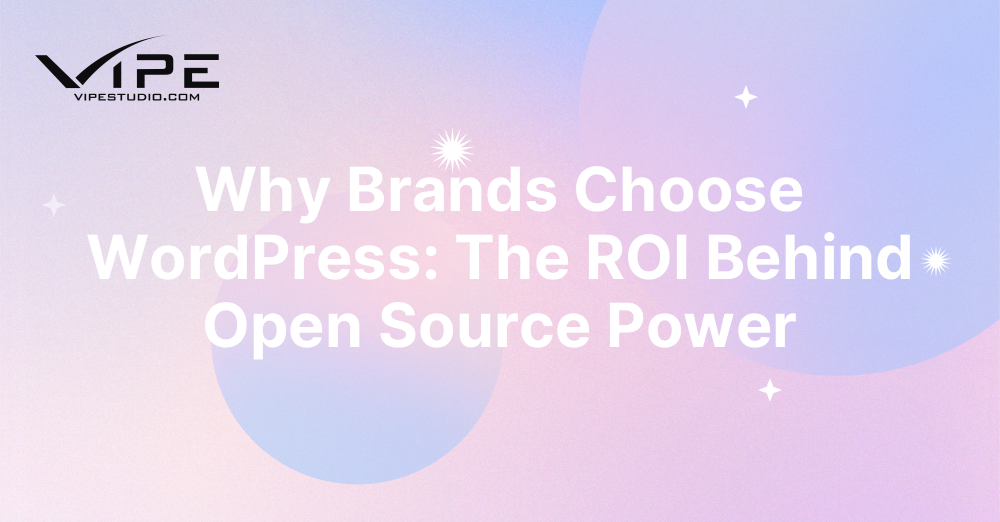19.11.2025
WordPress Development
Why Brands Choose WordPress: The ROI Behind Open Source Power
READING TIME: MIN
Table of Content
Introduction: The Business Case for WordPress
In an era where digital presence directly correlates with brand success, WordPress stands out not merely as a content management system, but as a strategic asset. Its open-source nature, scalability, and adaptability make it an attractive choice for brands seeking measurable returns on investment. This article explores why companies select WordPress, examining the economic, technical, and operational factors that contribute to its enduring popularity.
Open Source: Freedom and Flexibility
WordPress is open source, meaning organizations can modify, extend, and distribute the software without licensing fees. This flexibility translates into tangible ROI: brands can implement custom functionality without incurring ongoing platform costs, and developers can innovate rapidly. Organizations often engage WordPress experts to optimize implementation while maintaining adherence to best practices.
Cost Efficiency and Resource Allocation
Compared to proprietary systems, WordPress offers significant cost advantages. Development cycles are often shorter due to the availability of plugins and themes, and maintenance expenses can be lower due to the wide pool of experienced developers. These savings allow organizations to allocate resources toward marketing, content creation, and user experience enhancements rather than platform licensing fees.
Scalability and Enterprise Adoption
Brands are increasingly leveraging WordPress at enterprise scale. From microsites to corporate networks, WordPress accommodates complex architectures through Multisite, headless CMS integrations, and cloud hosting. Its modular design allows incremental scaling: organizations can add features, users, or sites without overhauling the infrastructure. This adaptability directly affects ROI by reducing future redevelopment costs.
Rapid Deployment and Market Agility
Time-to-market is critical for brands seeking competitive advantage. WordPress enables rapid deployment of websites, landing pages, and content-driven campaigns. With prebuilt themes, reusable components, and robust APIs, businesses can iterate and launch initiatives faster than with many proprietary platforms. Agile development reduces opportunity cost and increases responsiveness to market trends.
User Experience and Brand Consistency
WordPress allows organizations to maintain brand consistency while providing engaging user experiences. Flexible theming, customizable templates, and plugins for personalization ensure that digital touchpoints align with brand identity. Businesses benefit from increased engagement and conversion rates, translating directly into higher ROI.
Integration with Marketing and Analytics Tools
WordPress integrates seamlessly with marketing automation, CRM, SEO, and analytics tools. Brands can track performance, optimize campaigns, and refine content strategies based on real-time data. This measurable approach allows companies to justify investment in the platform and strategically allocate resources for maximum impact.
Security and Maintenance Best Practices
Open-source does not mean unprotected. Security in WordPress relies on consistent updates, careful plugin management, and server hardening. Organizations often collaborate with a professional WordPress team to audit security, monitor performance, and implement best practices. Secure and maintained sites protect brand reputation and prevent costly downtime, contributing to overall ROI.
Community and Ecosystem Support
The WordPress community is one of the largest in the tech world, providing free resources, documentation, and support forums. Brands benefit from this ecosystem through reduced development costs and access to a broad talent pool. Open-source contributions also ensure continuous innovation, allowing organizations to leverage new features and enhancements without additional licensing fees.
Case Studies: Measurable ROI
Several brands demonstrate the financial and operational benefits of WordPress:
- A multinational company reduced site development time by 40% using WordPress Multisite.
- An e-commerce brand increased conversion rates by 25% after implementing personalized content modules.
- A media company decreased hosting and maintenance costs by over 30% after consolidating sites on WordPress.
Each case illustrates that strategic adoption of WordPress aligns with cost savings, speed, and business agility.
Conclusion: The Strategic Value of WordPress
WordPress is more than a platform; it is a business tool that provides measurable ROI through cost efficiency, scalability, rapid deployment, and integration capabilities. By leveraging the open-source ecosystem, brands gain flexibility, security, and access to a vibrant community. Organizations that strategically implement WordPress position themselves to maximize operational efficiency, strengthen brand identity, and enhance engagement, proving that the choice of platform is not just technical – it is a strategic business decision.
Key Takeaways
- WordPress offers cost efficiency and resource flexibility through open-source licensing.
- Scalable architecture supports enterprise and complex site networks.
- Rapid deployment accelerates time-to-market and reduces opportunity costs.
- Integration with marketing and analytics tools provides measurable ROI.
- Security, maintenance, and community support strengthen brand reliability.
- Strategic adoption of WordPress aligns technical choices with business objectives.
More on The Topic
- Navigating WooCommerce Performance: Real-World Strategies
- The Role of AI in WordPress Development Workflows
- Optimizing WordPress for Enterprise: Beyond Basic Caching
- WordPress and Headless Commerce: A Provocative Dilemma
- Decoupled WordPress Architecture: The Future or a Fad?
The content of this website is copyrighted and protected by Creative Commons 4.0.



